Latest episode
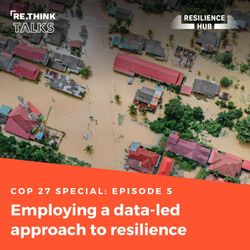
5. Employing a data-led approach to resilience
12:29||Season 3, Ep. 5Does practice make perfect? Do countries become more resilient to disasters the more they experience them? Or does their resilience break down when disasters strike again and again?Today’s guest is Sarah Cumbers, Evidence and Insight Director at the Lloyds Register Foundation. She shares the latest data from the foundation’s World Risk Poll. The poll asked people around the globe about their perceptions on risk and safety with the aim of understanding where strengths lie and what can be improved. Your host is Annette Hertwig.About Rethink TalksRethink Talks is Stockholm Resilience Centre’s podcast series on resilience thinking and global change. It spotlights conversations between experts on a range of topics that highlight how resilience thinking and biosphere stewardship add value to current debates.This season of the podcast is a collaboration between the Stockholm Resilience Centre and the Resilience Hub, released during and after COP27.
More episodes
View all episodes
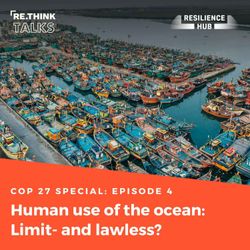
4. Human use of the ocean: Limit- and lawless?
15:04||Season 3, Ep. 4The seas are getting crowded. As commercial use of the ocean accelerates exponentially and climate change impacts worsen, marine ecosystems and coastal communities are feeling unprecedented pressures. The ocean has been a source of food since the dawn of time, it facilitates our modern communication, transports our merchandise and is often perceived as a lawless, new economic frontier.This episode's guest, Jean-Baptiste Jouffray, who is a researcher at the Stockholm Resilience Centre, expands on the new ocean reality. He proposes that the ocean may not be as lawless as we think and that we need to ramp up investment and stewardship of the vast waters that are giving us so much. Host for this episode is Annette Hertwig.About Rethink TalksRethink Talks is Stockholm Resilience Centre’s podcast series on resilience thinking and global change. It spotlights conversations between experts on a range of topics that highlight how resilience thinking and biosphere stewardship add value to current debates.This season of the podcast is a collaboration between the Stockholm Resilience Centre and the Resilience Hub, released during COP27.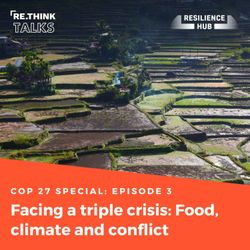
3. Facing a triple crisis: Food, climate and conflict
23:58||Season 3, Ep. 3Food insecurity, climate change and conflict are placing considerable pressure on the global food system. Inequality, access to land, access to nutrient-rich foods, and the loss of local food cultures and diversity are realities further amplified in the new risk landscape. These challenges are also playing out differently depending on the region you inhabit. In other words, the global south and the global north are both feeling the pressure, however, in disparate ways.This episode's guests Cibele Queiroz and Albert Norström discuss the challenges our global food systems face and explore ways through which we can move towards more resilient, sustainable and just food systems. Albert Norström is a researcher at the Stockholm Resilience Centre and head of knowledge and evidence at the Global Resilience Partnership. Cibele Queiroz is a researcher at the Stockholm Resilience Centre and Global Resilience Partnership. Your host is Annette Hertwig.About Rethink TalksRethink Talks is Stockholm Resilience Centre’s podcast series on resilience thinking and global change. It spotlights conversations between experts on a range of topics that highlight how resilience thinking and biosphere stewardship add value to current debates.This season of the podcast is a collaboration between the Stockholm Resilience Centre and the Resilience Hub, released during COP27.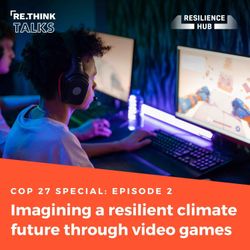
2. Imagining a resilient climate future through video games
12:51||Season 3, Ep. 2What if decision-makers could live through and feel the future consequences of climate change in action today? Would it influence their policy choices? And could gaming or virtual reality simulations help to prioritize action in climate adaptation and resilience building?Video games have evolved beyond pure entertainment and now have the potential to reach a global community of 3 billion people with climate resilience skills and promote behavioural change.Today's guests, video game consultant Chance Glasco and Rosemary Mann from the Arsht-Rock Resilience Center, share their experience in creating gaming technologies for world leaders. Your host is Annette Hertwig. About Rethink TalksRethink Talks is Stockholm Resilience Centre’s podcast series on resilience thinking and global change. It spotlights conversations between experts on a range of topics that highlight how resilience thinking and biosphere stewardship add value to current debates.This season of the podcast is a collaboration between the Stockholm Resilience Centre and the Resilience Hub, released during COP27.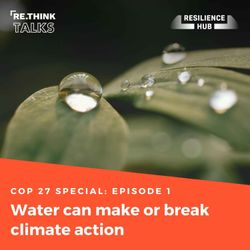
1. Water can make or break climate action
18:25||Season 3, Ep. 1Droughts, storms or sea water rise – climate change takes its form almost always through a change in water. But water is more than just a destructive force, it is the bloodstream of the biosphere.In this episode Lan Wang Erlandsson, a researcher at the Stockholm Resilience Centre, shares with us how freshwater can make or break our ability to successfully combat climate change. She also explains why climate policies must look beyond transitions to renewable energy. Your host is Annette Hertwig.Further reading for this episodeUnpacking freshwater's role in climate change mitigationFreshwater boundary exceeds safe limits About Rethink TalksRethink Talks is Stockholm Resilience Centre’s podcast series on resilience thinking and global change. It spotlights conversations between experts on a range of topics that highlight how resilience thinking and biosphere stewardship add value to current debates.This season of the podcast is a collaboration between the Stockholm Resilience Centre and the Resilience Hub, released during COP27.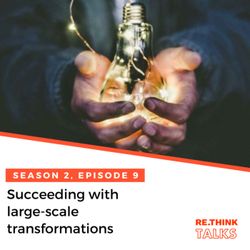
9. Succeeding with large-scale transformations
29:37||Season 2, Ep. 9How can systemic transformations be achieved at the scale, speed, and quality that is needed? And what capacities are required to navigate these transformations?In this episode, Stockholm Resilience Centre researcher Per Olsson talks to Funda Sezgi and François Bonnici about the frontiers of transformation and system change. Sezgi is the co-founder and managing director of the Norrsken Impact Accelerator at Norrsken Foundation, while Bonnici is director of the Schwab Foundation for Social Entrepreneurship, head of social innovation at the World Economic Forum and co-author of the recently published book The Systems Work of Social Change.About Rethink TalksRethink Talks is Stockholm Resilience Centre’s podcast series on resilience thinking and global change. It spotlights conversations between experts on a range of topics that highlight how resilience thinking and biosphere stewardship add value to current debates.Available on all major platforms such as Spotify, YouTube, Apple Podcast and Soundcloud.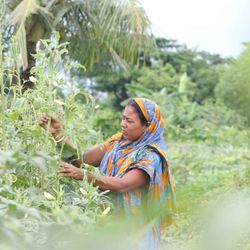
8. Who are the real experts of climate change adaptation?
30:30||Season 2, Ep. 8The sixth IPCC report sent a clear message: we are one minute to midnight and the rate and scale of action that is required is immense. However, all too often, the solutions presented are top-down and framed in an outdated North-South perspective. We need voices from the climate change frontline to not only be rightfully acknowledged and valued, but to be learned from as climate adaptation experts.In this episode, Ameil Harikishun, policy officer for the Global Resilience Partnership, talks to Harini Nagendra, director of Research Center and head of Center for Climate Change and Sustainability, both at the Azim Premji University in India. And Saleemul Huq, director of the International Centre for Climate Change and Development in Bangladesh and Professor at the Independent University Bangladesh. With decades of experience combined, they share their insights on locally led adaption and what is needed for it to work.
